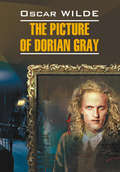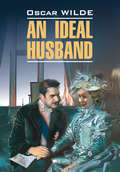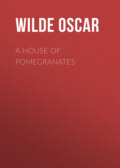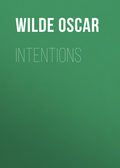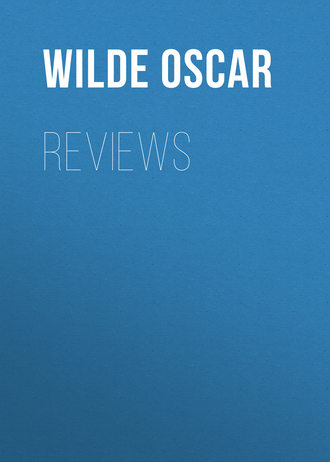
Оскар Уайльд
Reviews
A CHEAP EDITION OF A GREAT MAN
(Pall Mall Gazette, April 18, 1887.)
Formerly we used to canonise our great men; nowadays we vulgarise them. The vulgarisation of Rossetti has been going on for some time past with really remarkable success, and there seems no probability at present of the process being discontinued. The grass was hardly green upon the quiet grave in Birchington churchyard when Mr. Hall Caine and Mr. William Sharp rushed into print with their Memoirs and Recollections. Then came the usual mob of magazine-hacks with their various views and attitudes, and now Mr. Joseph Knight has produced for the edification of the British public a popular biography of the poet of the Blessed Damozel, the painter of Dante’s Dream.
It is only fair to state that Mr. Knight’s work is much better than that of his predecessors in the same field. His book is, on the whole, modestly and simply written; whatever its other faults may be, it is at least free from affectation of any kind; and it makes no serious pretence at being either exhaustive or definitive. Yet the best we can say of it is that it is just the sort of biography Guildenstern might have written of Hamlet. Nor does its unsatisfactory character come merely from the ludicrous inadequacy of the materials at Mr. Knight’s disposal; it is the whole scheme and method of the book that is radically wrong. Rossetti’s was a great personality, and personalities such as his do not easily survive shilling primers. Sooner or later they have inevitably to come down to the level of their biographers, and in the present instance nothing could be more absolutely commonplace than the picture Mr. Knight gives us of the wonderful seer and singer whose life he has so recklessly essayed to write.
No doubt there are many people who will be deeply interested to know that Rossetti was once chased round his garden by an infuriated zebu he was trying to exhibit to Mr. Whistler, or that he had a great affection for a dog called ‘Dizzy,’ or that ‘sloshy’ was one of his favourite words of contempt, or that Mr. Gosse thought him very like Chaucer in appearance, or that he had ‘an absolute disqualification’ for whist-playing, or that he was very fond of quoting the Bab Ballads, or that he once said that if he could live by writing poetry he would see painting d-d! For our part, however, we cannot help expressing our regret that such a shallow and superficial biography as this should ever have been published. It is but a sorry task to rip the twisted ravel from the worn garment of life and to turn the grout in a drained cup. Better, after all, that we knew a painter only through his vision and a poet through his song, than that the image of a great man should be marred and made mean for us by the clumsy geniality of good intentions. A true artist, and such Rossetti undoubtedly was, reveals himself so perfectly in his work, that unless a biographer has something more valuable to give us than idle anecdotes and unmeaning tales, his labour is misspent and his industry misdirected.
Bad, however, as is Mr. Knight’s treatment of Rossetti’s life, his treatment of Rossetti’s poetry is infinitely worse. Considering the small size of the volume, and the consequently limited number of extracts, the amount of misquotation is almost incredible, and puts all recent achievements in this sphere of modern literature completely into the shade. The fine line in the first canto of Rose Mary:
What glints there like a lance that flees?
appears as:
What glints there like a glance that flees?
which is very painful nonsense; in the description of that graceful and fanciful sonnet Autumn Idleness, the deer are represented as ‘grazing from hillock eaves’ instead of gazing from hillock-eaves; the opening of Dantis Tenebræ is rendered quite incomprehensible by the substitution of ‘my’ for ‘thy’ in the second line; even such a well-known ballad as Sister Helen is misquoted, and, indeed, from the Burden of Nineveh, the Blessed Damozel, the King’s Tragedy and Guido Cavalcanti’s lovely ballata, down to the Portrait and such sonnets as Love-sweetness, Farewell to the Glen, and A Match with the Moon, there is not one single poem that does not display some careless error or some stupid misprint.
As for Rossetti’s elaborate system of punctuation, Mr. Knight pays no attention to it whatsoever. Indeed, he shows quite a rollicking indifference to all the secrets and subtleties of style, and inserts or removes stops in a manner that is absolutely destructive to the lyrical beauty of the verse. The hyphen, also, so constantly employed by Rossetti in the case of such expressions as ‘hillock-eaves’ quoted above, ‘hill-fire,’ ‘birth-hour,’ and the like, is almost invariably disregarded, and by the brilliant omission of a semicolon Mr. Knight has succeeded in spoiling one of the best stanzas in The Staff and Scrip– a poem, by the way, that he speaks of as The Staff and the Scrip (sic). After this tedious comedy of errors it seems almost unnecessary to point out that the earliest Italian poet is not called Ciullo D’Alcano (sic), or that The Bothie of Toper-na-Fuosich (sic) is not the title of Clough’s boisterous epic, or that Dante and his Cycle (sic) is not the name Rossetti gave to his collection of translations; and why Troy Town should appear in the index as Tory Town is really quite inexplicable, unless it is intended as a compliment to Mr. Hall Caine who once dedicated, or rather tried to dedicate, to Rossetti a lecture on the relations of poets to politics. We are sorry, too, to find an English dramatic critic misquoting Shakespeare, as we had always been of opinion that this was a privilege reserved specially for our English actors. We sincerely hope that there will soon be an end to all biographies of this kind. They rob life of much of its dignity and its wonder, add to death itself a new terror, and make one wish that all art were anonymous. Nor could there have been any more unfortunate choice of a subject for popular treatment than that to which we owe the memoir that now lies before us. A pillar of fire to the few who knew him, and of cloud to the many who knew him not, Dante Gabriel Rossetti lived apart from the gossip and tittle-tattle of a shallow age. He never trafficked with the merchants for his soul, nor brought his wares into the market-place for the idle to gape at. Passionate and romantic though he was, yet there was in his nature something of high austerity. He loved seclusion, and hated notoriety, and would have shuddered at the idea that within a few years after his death he was to make his appearance in a series of popular biographies, sandwiched between the author of Pickwick and the Great Lexicographer. One man alone, the friend his verse won for him, did he desire should write his life, and it is to Mr. Theodore Watts that we, too, must look to give us the real Rossetti. It may be admitted at once that Mr. Watts’s subject has for the moment been a little spoiled for him. Rude hands have touched it, and unmusical voices have made it sound almost common in our ears. Yet none the less is it for him to tell us of the marvel of this man whose art he has analysed with such exquisite insight, whose life he knows as no one else can know it, whom he so loyally loved and tended, and by whom he was so loyally beloved in turn. As for the others, the scribblers and nibblers of literature, if they indeed reverence Rossetti’s memory, let them pay him the one homage he would most have valued, the gracious homage of silence. ‘Though you can fret me, yet you cannot play upon me,’ says Hamlet to his false friend, and even so might Rossetti speak to those well-intentioned mediocrities who would seem to know his stops and would sound him to the top of his compass. True, they cannot fret him now, for he has passed beyond the possibility of pain; yet they cannot play upon him either; it is not for them to pluck out the heart of his mystery.
There is, however, one feature of this book that deserves unstinted praise. Mr. Anderson’s bibliography will be found of immense use by every student of Rossetti’s work and influence. Perhaps Young’s very powerful attack on Pre-Raphaelitism, as expounded by Mr. Ruskin (Longmans, 1857), might be included, but, in all other respects, it seems quite complete, and the chronological list of paintings and drawings is really admirable. When this unfortunate ‘Great Writers’ Series comes to an end, Mr. Anderson’s bibliographies should be collected together and published in a separate volume. At present they are in a very second-rate company indeed.
Life of Dante Gabriel Rossetti. By Joseph Knight. ‘Great Writers’ Series. (Walter Scott.)
MR. MORRIS’S ODYSSEY
(Pall Mall Gazette, April 26, 1887.)
Of all our modern poets, Mr. William Morris is the one best qualified by nature and by art to translate for us the marvellous epic of the wanderings of Odysseus. For he is our only true story-singer since Chaucer; if he is a Socialist, he is also a Saga-man; and there was a time when he was never wearied of telling us strange legends of gods and men, wonderful tales of chivalry and romance. Master as he is of decorative and descriptive verse, he has all the Greek’s joy in the visible aspect of things, all the Greek’s sense of delicate and delightful detail, all the Greek’s pleasure in beautiful textures and exquisite materials and imaginative designs; nor can any one have a keener sympathy with the Homeric admiration for the workers and the craftsmen in the various arts, from the stainers in white ivory and the embroiderers in purple and fold, to the weaver sitting by the loom and the dyer dipping in the vat, the chaser of shield and helmet, the carver of wood or stone. And to all this is added the true temper of high romance, the power to make the past as real to us as the present, the subtle instinct to discern passion, the swift impulse to portray life.
It is no wonder the lovers of Greek literature have so eagerly looked forward to Mr. Morris’s version of the Odyssean epic, and now that the first volume has appeared, it is not extravagant to say that of all our English translations this is the most perfect and the most satisfying. In spite of Coleridge’s well-known views on the subject, we have always held that Chapman’s Odyssey is immeasurably inferior to his Iliad, the mere difference of metre alone being sufficient to set the former in a secondary place; Pope’s Odyssey, with its glittering rhetoric and smart antithesis, has nothing of the grand manner of the original; Cowper is dull, and Bryant dreadful, and Worsley too full of Spenserian prettinesses; while excellent though Messrs. Butcher and Lang’s version undoubtedly is in many respects, still, on the whole, it gives us merely the facts of the Odyssey without providing anything of its artistic effect. Avia’s translation even, though better than almost all its predecessors in the same field, is not worthy of taking rank beside Mr. Morris’s, for here we have a true work of art, a rendering not merely of language into language, but of poetry into poetry, and though the new spirit added in the transfusion may seem to many rather Norse than Greek, and, perhaps at times, more boisterous than beautiful, there is yet a vigour of life in every line, a splendid ardour through each canto, that stirs the blood while one reads like the sound of a trumpet, and that, producing a physical as well as a spiritual delight, exults the senses no less than it exalts the soul. It may be admitted at once that, here and there, Mr. Morris has missed something of the marvellous dignity of the Homeric verse, and that, in his desire for rushing and ringing metre, he has occasionally sacrificed majesty to movement, and made stateliness give place to speed; but it is really only in such blank verse as Milton’s that this effect of calm and lofty music can be attained, and in all other respects blank verse is the most inadequate medium for reproducing the full flow and fervour of the Greek hexameter. One merit, at any rate, Mr. Morris’s version entirely and absolutely possesses. It is, in no sense of the word, literary; it seems to deal immediately with life itself, and to take from the reality of things its own form and colour; it is always direct and simple, and at its best has something of the ‘large utterance of the early gods.’
As for individual passages of beauty, nothing could be better than the wonderful description of the house of the Phœacian king, or the whole telling of the lovely legend of Circe, or the manner in which the pageant of the pale phantoms in Hades is brought before our eyes. Perhaps the huge epic humour of the escape from the Cyclops is hardly realised, but there is always a linguistic difficulty about rendering this fascinating story into English, and where we are given so much poetry we should not complain about losing a pun; and the exquisite idyll of the meeting and parting with the daughter of Alcinous is really delightfully told. How good, for instance, is this passage taken at random from the Sixth Book:
But therewith unto the handmaids goodly Odysseus spake:
‘Stand off I bid you, damsels, while the work in hand I take,
And wash the brine from my shoulders, and sleek them all around.
Since verily now this long while sweet oil they have not found.
But before you nought will I wash me, for shame I have indeed,
Amidst of fair-tressed damsels to be all bare of weed.’
So he spake and aloof they gat them, and thereof they told the may,
But Odysseus with the river from his body washed away
The brine from his back and his shoulders wrought broad and mightily,
And from his head was he wiping the foam of the untilled sea;
But when he had throughly washed him, and the oil about him had shed
He did upon the raiment the gift of the maid unwed.
But Athene, Zeus-begotten, dealt with him in such wise
That bigger yet was his seeming, and mightier to all eyes,
With the hair on his head crisp curling as the bloom of the daffodil.
And as when the silver with gold is o’erlaid by a man of skill,
Yea, a craftsman whom Hephæstus and Pallas Athene have taught
To be master over masters, and lovely work he hath wrought;
So she round his head and his shoulders shed grace abundantly.
It may be objected by some that the line
With the hair on his head crisp curling as the bloom of the daffodil,
is a rather fanciful version of
ουλας ηκε κομας, νακινθινω ανθει ομοιας
and it certainly seems probable that the allusion is to the dark colour of the hero’s hair; still, the point is not one of much importance, though it may be worth noting that a similar expression occurs in Ogilby’s superbly illustrated translation of the Odyssey, published in 1665, where Charles II.’s Master of the Revels in Ireland gives the passage thus:
Minerva renders him more tall and fair,
Curling in rings like daffodils his hair.
No anthology, however, can show the true merit of Mr. Morris’s translation, whose real merit does not depend on stray beauties, nor is revealed by chance selections, but lies in the absolute rightness and coherence of the whole, in its purity and justice of touch, its freedom from affectation and commonplace, its harmony of form and matter. It is sufficient to say that this is a poet’s version of a poet, and for such surely we should be thankful. In these latter days of coarse and vulgar literature, it is something to have made the great sea-epic of the South native and natural to our northern isle, something to have shown that our English speech may be a pipe through which Greek lips can blow, something to have taught Nausicaa to speak the same language as Perdita.
The Odyssey of Homer. Done into English Verse by William Morris, author of The Earthly Paradise. In two volumes. Volume I. (Reeves and Turner.)
For review of Volume II. see Mr. Morris’s Completion of the Odyssey, page 215.
A BATCH OF NOVELS
(Pall Mall Gazette, May 2, 1887.)
Of the three great Russian novelists of our time Tourgenieff is by far the finest artist. He has that spirit of exquisite selection, that delicate choice of detail, which is the essence of style; his work is entirely free from any personal intention; and by taking existence at its most fiery-coloured moments he can distil into a few pages of perfect prose the moods and passions of many lives.
Count Tolstoi’s method is much larger, and his field of vision more extended. He reminds us sometimes of Paul Veronese, and, like that great painter, can crowd, without over-crowding, the giant canvas on which he works. We may not at first gain from his works that artistic unity of impression which is Tourgenieff’s chief charm, but once that we have mastered the details the whole seems to have the grandeur and the simplicity of an epic. Dostoieffski differs widely from both his rivals. He is not so fine an artist as Tourgenieff, for he deals more with the facts than with the effects of life; nor has he Tolstoi’s largeness of vision and epic dignity; but he has qualities that are distinctively and absolutely his own, such as a fierce intensity of passion and concentration of impulse, a power of dealing with the deepest mysteries of psychology and the most hidden springs of life, and a realism that is pitiless in its fidelity, and terrible because it is true. Some time ago we had occasion to draw attention to his marvellous novel Crime and Punishment, where in the haunt of impurity and vice a harlot and an assassin meet together to read the story of Dives and Lazarus, and the outcast girl leads the sinner to make atonement for his sin; nor is the book entitled Injury and Insult at all inferior to that great masterpiece. Mean and ordinary though the surroundings of the story may seem, the heroine Natasha is like one of the noble victims of Greek tragedy; she is Antigone with the passion of Phædra, and it is impossible to approach her without a feeling of awe. Greek also is the gloom of Nemesis that hangs over each character, only it is a Nemesis that does not stand outside of life, but is part of our own nature and of the same material as life itself. Aleósha, the beautiful young lad whom Natasha follows to her doom, is a second Tito Melema, and has all Tito’s charm and grace and fascination. Yet he is different. He would never have denied Baldassare in the Square at Florence, nor lied to Romola about Tessa. He has a magnificent, momentary sincerity, a boyish unconsciousness of all that life signifies, an ardent enthusiasm for all that life cannot give. There is nothing calculating about him. He never thinks evil, he only does it. From a psychological point of view he is one of the most interesting characters of modem fiction, as from an artistic he is one of the most attractive. As we grow to know him he stirs strange questions for us, and makes us feel that it is not the wicked only who do wrong, nor the bad alone who work evil.
And by what a subtle objective method does Dostoieffski show us his characters! He never tickets them with a list nor labels them with a description. We grow to know them very gradually, as we know people whom we meet in society, at first by little tricks of manner, personal appearance, fancies in dress, and the like; and afterwards by their deeds and words; and even then they constantly elude us, for though Dostoieffski may lay bare for us the secrets of their nature, yet he never explains his personages away; they are always surprising us by something that they say or do, and keep to the end the eternal mystery of life.
Irrespective of its value as a work of art, this novel possesses a deep autobiographical interest also, as the character of Vania, the poor student who loves Natasha through all her sin and shame, is Dostoieffski’s study of himself. Goethe once had to delay the completion of one of his novels till experience had furnished him with new situations, but almost before he had arrived at manhood Dostoieffski knew life in its most real forms; poverty and suffering, pain and misery, prison, exile, and love, were soon familiar to him, and by the lips of Vania he has told his own story. This note of personal feeling, this harsh reality of actual experience, undoubtedly gives the book something of its strange fervour and terrible passion, yet it has not made it egotistic; we see things from every point of view, and we feel, not that fiction has been trammelled by fact, but that fact itself has become ideal and imaginative. Pitiless, too, though Dostoieffski is in his method as an artist, as a man he is full of human pity for all, for those who do evil as well as for those who suffer it, for the selfish no less than for those whose lives are wrecked for others and whose sacrifice is in vain. Since Adam Bede and Le Père Goriot no more powerful novel has been written than Insult and Injury.
Mr. Hardinge’s book Willow Garth deals, strangely enough, with something like the same idea, though the treatment is, of course, entirely different. A girl of high birth falls passionately in love with a young farm-bailiff who is a sort of Arcadian Antinous and a very Ganymede in gaiters. Social difficulties naturally intervene, so she drowns her handsome rustic in a convenient pond. Mr. Hardinge has a most charming style, and, as a writer, possesses both distinction and grace. The book is a delightful combination of romance and satire, and the heroine’s crime is treated in the most picturesque manner possible.
Marcella Grace tells of modern life in Ireland, and is one of the best books Miss Mulholland has ever published. In its artistic reserve, and the perfect simplicity of its style, it is an excellent model for all lady-novelists to follow, and the scene where the heroine finds the man, who has been sent to shoot her, lying fever-stricken behind a hedge with his gun by his side, is really remarkable. Nor could anything be better than Miss Mulholland’s treatment of external nature. She never shrieks over scenery like a tourist, nor wearies us with sunsets like the Scotch school; but all through her book there is a subtle atmosphere of purple hills and silent moorland; she makes us live with nature and not merely look at it.
The accomplished authoress of Soap was once compared to George Eliot by the Court Journal, and to Carlyle by the Daily News, but we fear that we cannot compete with our contemporaries in these daring comparisons. Her present book is very clever, rather vulgar, and contains some fine examples of bad French.
As for A Marked Man, That Winter Night, and Driven Home, the first shows some power of description and treatment, but is sadly incomplete; the second is quite unworthy of any man of letters, and the third is absolutely silly. We sincerely hope that a few more novels like these will be published, as the public will then find out that a bad book is very dear at a shilling.
(1) Injury and Insult. By Fedor Dostoieffski. Translated from the Russian by Frederick Whishaw. (Vizetelly and Co.)
(2) The Willow Garth. By W. M. Hardinge. (Bentley and Son.)
(3) Marcella Grace. By Rosa Mulholland. (Macmillan and Co.)
(4) Soap. By Constance MacEwen. (Arrowsmith.)
(5) A Marked Man. By Faucet Streets. (Hamilton and Adams.)
(6) That Winter Night. By Robert Buchanan. (Arrowsmith.)
(7) Driven Home. By Evelyn Owen. (Arrowsmith.)



